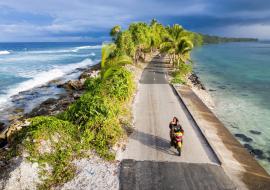UN Tourism and Germany Promote Inclusive Employment, Accessibility

UN Tourism has partnered with Germany’s Federal Ministry for Economic Cooperation and Development (BMZ) to drive a shift in how destinations and businesses perceive workers and travelers with disabilities. This collaboration seeks to break down barriers and create a more inclusive tourism industry, recognizing accessibility as both a fundamental right and a significant economic opportunity.
With 1.3 billion people living with disabilities worldwide—80% of them in developing or emerging destinations—accessible tourism represents an untapped market. Travelers with disabilities often journey with two to three companions, highlighting the potential for businesses to expand their customer base. Despite these opportunities, discrimination and a lack of inclusive infrastructure continue to limit their participation in travel and employment.
At ITB Berlin 2025, UN Tourism and BMZ spotlighted the benefits of accessibility, calling for global cooperation to generate jobs, boost economic resilience, and make travel more inclusive. They emphasized that accessibility should not be viewed as charity but as a long-term investment that fosters innovation, benefits communities, and unlocks a billion-dollar market.
The event gathered industry leaders to explore solutions for creating workplaces and services that cater to all. Discussions focused on integrating accessibility into business models, leveraging social and digital innovation, and ensuring that the tourism sector actively supports a diverse workforce. Success stories from countries like Albania, Austria, Ecuador, Germany, India, Jordan, and Morocco were shared, alongside insights from key industry players such as the World Sustainable Hospitality Alliance and the European Network for Accessible Tourism.
A forthcoming report will outline best practices and key recommendations, including involving people with disabilities in the design of services, building a strong business case for accessibility, training employees, and adapting job roles to make hospitality careers more accessible. Through these efforts, UN Tourism and BMZ aim to pave the way for a more inclusive, equitable, and forward-thinking tourism industry.














